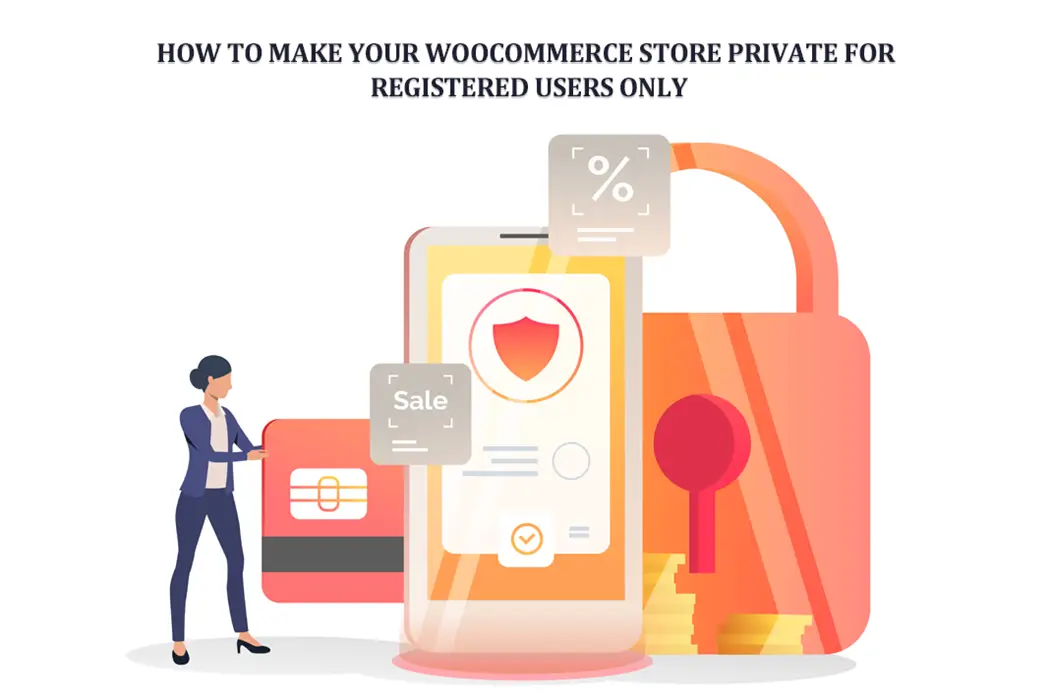How to Make Your WooCommerce Store Private for Registered Users Only
Why keep your store private?
Imagine this. You walk by a shop. Doors shut. Curtains drawn. A little sign says “Members Only.” Feels mysterious, right? You wonder what’s inside. You wonder if you could get in. That’s exactly the kind of pull a private WooCommerce store has.
Not every shop should be open for the whole world. Some stores run on exclusivity. Wholesale businesses. Membership shops. Even small niche brands. They don’t need random people scrolling prices, copying details, or filling carts they’ll never buy. They need control.
And control comes with privacy. You decide who enters. You decide who buys. The people who do get in—they feel special. Like they belong to a secret circle. That’s the magic of keeping your WooCommerce store private.
Why Consider a Private WooCommerce Store?
Here’s the truth. Not every visitor is your customer. Some browse. Some compare. Some snoop. You don’t need that. A private store filters the crowd. It lets in only those who matter.
Think wholesale suppliers. They don’t want to waste time on one-off buyers. Think B2B sellers. They want serious clients, not casual shoppers. Even creative artists sometimes sell only to approved members. Privacy makes sense.
It also protects you. Competitors can’t spy on prices. Strangers can’t steal your product ideas. And you—well, you focus on real buyers, not window shoppers.
Privacy doesn’t shrink your store. It strengthens it. Less noise, more quality. It’s not about hiding. It’s about choosing.
Benefits of a Private Shop Setup
Let’s talk perks.
First, protection. Your prices stay safe. No outsiders poking around.
Second, exclusivity. Customers feel like insiders. Access feels earned. And people value what feels earned.
Third, cleaner customer data. Since only approved users register, your list is pure gold. No spam signups. No junk leads.
Fourth, trust. When you personally approve buyers, they know they’re part of something. That bond matters.
And finally, time. Less hassle with random queries. More focus on actual sales.
Private stores aren’t about shutting doors. They’re about opening them—just for the right people.
Different Ways to Make Your Store Private
There’s more than one way to hide a shop. Some easy. Some advanced.
The simplest? Password protection. WordPress lets you lock pages with a password. Handy, but messy. Works for a single product, maybe. Not for a whole store.
Another way? Restrict categories. Hide some products while leaving others open. Better, but still clunky.
The best? Plugins. They handle everything. No coding. No stress. Want the whole shop hidden? Done. Are only certain products hidden? Easy. Redirect guests to a login page? Simple.
Plugins also let you manage user roles, approvals, and even emails. It’s like having a private bouncer for your store. Only approved guests step in. Everyone else? Blocked.
Using Plugins to Create a Private Store
Here’s where it gets fun. Plugins give you control. They lock your store down without breaking usability.
Most plugins work the same. Install. Activate. Configure. Boom. Your store goes private. Non-logged-in users see nothing. Registered ones see everything.
But the real power is in customization. Custom login pages. Approval systems. Role-based access. Automated emails. Even fancy backgrounds for your login form.
With plugins, privacy feels professional. Not just a locked door—but a designed entrance.
WooCommerce Private Shop
One solid option? WooCommerce Private Store. It does exactly what the name says. Hide your shop. Hide specific products. Redirect guests straight to login or registration.
Admins can manually approve registrations. Or set it to auto-approve. Emails go out automatically—when someone signs up, when they’re approved. Everything runs smoothly.
And customization? Yes. Logos, titles, and video backgrounds for login pages. Want your sign-in page to feel branded? Easy.
Perfect for wholesale stores. Membership sites. B2B shops. If you need privacy with flexibility, this plugin has it.
Setting Up a Private Store Step by Step
Okay, so how do you do it? Simple steps.
- Install your chosen plugin.
- Activate it.
- Decide what to hide—the whole store or certain products.
- Set up login and registration pages. Add branding. Add clarity.
- Configure approvals. Manual or automatic? Your call.
- Write your emails. Confirmation and approval messages. Keep them friendly.
- Test. Always test. Log out. Visit your shop as a guest. See what happens.
If guests can’t see products but approved users can—you nailed it.
Customizing User Roles and Access
User roles make privacy smarter. They let you split customers into groups.
Say you’re running wholesale and retail together. Wholesalers see bulk pricing. Regular customers see retail prices. Same shop, different views.
Some plugins even let users pick their role during registration. But don’t hand over control too easily. Always approve roles manually. Keeps things secure.
Roles help you target better. Different discounts. Different catalogs. Different access levels. One store, multiple layers.
Building Trust Through Registration
Registration isn’t just a gate. It’s a handshake.
When users sign up, you learn who they are. Their names. Their emails. Maybe even their company details. That’s gold for you.
But for them? It feels like membership. Like joining a club. People love belonging. Especially when it’s limited.
Make your registration page friendly. Not cold. Use clear words. Promise quick approval. The easier it feels, the more likely they’ll complete it.
Once they’re in, they stay loyal. Because you filtered them. And exclusivity creates loyalty.
Designing a Private Login Page Experience
Your login page is your front door. Make it count.
Ditch the plain white form. Add your logo. Change colors. Maybe even add a background video. Make it feel like a branded entry point.
Write a small tagline. Something like “Exclusive Access” or “Wholesale Members Only.” Remind them they’re special.
Keep the form simple. Don’t ask for twenty fields. Less friction, more logins.
A dull login page feels sketchy. A polished one builds trust. Design isn’t extra here—it’s essential.

WordPress or WooCommerce?
Do you want to build an online business and are confused about which platform is best for your e-commerce store, WordPress or WooCommerce? This article is for you.
Avoiding Common Mistakes with Private Stores
Some store owners mess it up. Bad.
They hide everything. No way for new users to register. That’s just shooting yourself in the foot.
Others auto-approve everyone. Kills the whole point of exclusivity.
Some forget mobile optimization. Big mistake. Most users shop on phones. If your login looks broken on mobile, you lose them.
And emails? Don’t ignore them. Always send confirmation and approval messages. Keeps people in the loop. Builds trust.
Privacy works best when it’s smooth. Don’t overcomplicate. Don’t under-protect.
Balancing Privacy and Usability
Privacy is good. But if it feels like a maze, users quit.
That’s where balance comes in. Registration should be simple, but secure. Login is strict, but clean. Store hidden, but sign-up visible.
Don’t just lock everything and walk away. Guide users. Tell them why the store is private. Tell them how to join.
The goal isn’t just to block. It’s to invite the right people in. That’s the balance.
SEO Considerations for Private Stores
Here’s the tricky part. SEO. If your whole store is private, Google can’t see products. That means less visibility.
But there’s a workaround. Keep a few teaser pages public. Like a landing page that explains your business. Or a “request access” page. Google can index that.
Some plugins also let you discourage indexing for private pages while keeping public ones visible. Best of both worlds.
Think smart. Attract traffic. Filter it with registration. Win-win.
Real-World Example
Let’s make it real. Imagine you sell clothing—wholesale only.
You don’t want regular shoppers clicking “Add to Cart.” You only want retailers. So, you install a private shop plugin.
Guests who visit see a registration page. It says, “Apply for Wholesale Access.” They fill out a form. You review it. Approve it. Done.
Once logged in, they see bulk prices, special packs, and exclusive items. Regular guests? They see nothing.
That’s how many wholesale stores already work online. Food suppliers. Furniture wholesalers. Even hardware stores. It’s practical. It’s profitable.
Conclusion
Privacy isn’t about hiding in the dark. It’s about smart selling.
A private WooCommerce store gives you control. Over who sees. Who buys. Who belongs. It protects your prices. It strengthens customer trust. It builds loyalty.
And with tools like WooCommerce Private Store, setting it up is easier than ever. One plugin. A few settings. And your store transforms into a members-only space.
So, don’t think of privacy as a wall. Think of it as a velvet rope. The right people walk through. The wrong ones don’t. And your business? It grows stronger.


